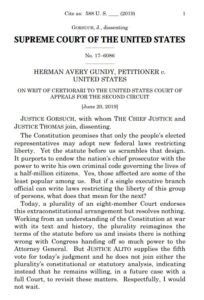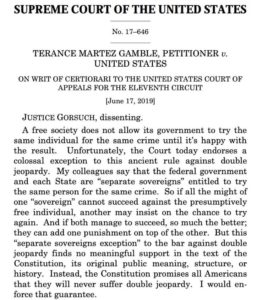Yesterday’s biggest news from the Supreme Court was not its 7-2 upholding of the Bladensburg, Md. Peace Cross (American Legion et al. v. American Humanist Association et al.; earlier). That outcome could readily have been foreseen given the result in earlier cases: Justices Stephen Breyer and Elena Kagan, to say nothing of the five conservatives, are prepared to uphold “longstanding monuments, symbols, and practices” that may include religious content but do not impose any significant harms on those of other faiths or none. This World War I memorial qualifies.
Instead, the big news is the outcome in Gundy v. U.S. (earlier), a case over whether Congress can delegate to the Department of Justice the power to decide how severe the penalties will be in one application of the sex offender registration law. While the critique of excessive delegation did not carry the day this time (the vote was 4-3-1 with Justice Brett Kavanaugh not participating), Justice Samuel Alito indicated that he would be inclined to look at the issue in a future case, and Kavanaugh is thought (from his D.C. Circuit jurisprudence) to be similarly minded. If so, then a future case could establish the important principle that Congress must spell out penalties and prohibitions in law itself, rather than punt such issues to executive agencies, at least in criminal matters and perhaps also in some regulatory ones. That’s huge, since the Court has rejected improper-delegation theories since the New Deal.

Justice Neil Gorsuch’s dissent in Gundy, together with his scalding dissent (earlier) in the double jeopardy/dual sovereignty case Gamble v. U.S. on Monday, makes him the libertarian hero of the week.

Filed under: constitutional law, Neil Gorsuch, religious liberty, Supreme Court


